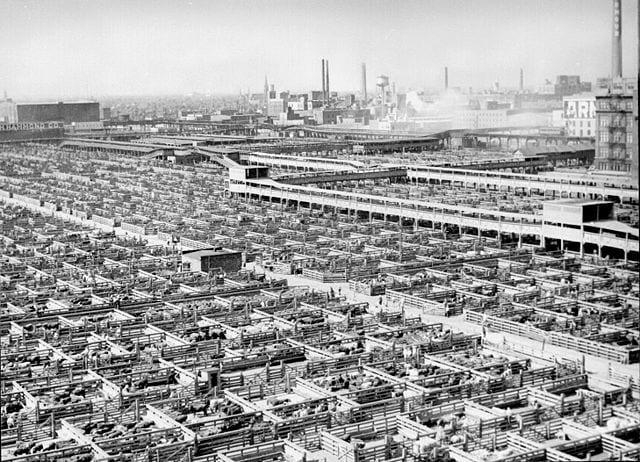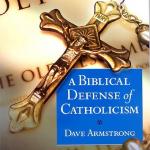
Jon Curry is a friend whom I know in person (not just online). I’ve been to his atheist meetings, and he’s been to my house twice, to deliver a talk. He’s a former evangelical Protestant and atheist. We drive each other nuts but we keep talkin’! His words will be in blue.
*****
Your argument takes you out of the fire and drops you right in the frying pan in my view. If you successfully argue that the bible sanctions killing animals for food you show that the bible just is not the words of a perfectly ethical being.
Once you accept the fact that animals suffer in death and you accept that eating animals is not necessary for nutrition (it isn’t) you have a problem, because causing unnecessary suffering is wrong. Even a swiftly killed cow doesn’t want to die, so it suffers in death. People who work at these farms often suffer PTSD, they see these weeping cows trying to avoid being killed. They see crying mothers chasing their calves as the calves are stolen from them so the milk can be taken and given to people and their babies killed. These mothers have been known to hide their calves from farmers. They know what is coming, often it’s not their first pregnancy.
All of this is unnecessary for our health. Veganism is among the most successful dietary approaches in terms of longevity and avoidance of chronic disease. Some approaches with light meat eating are just as good, but veganism is a successful option. The conclusion is inescapable. Killing animals for food, except in the cases where the alternative is starvation, is wrong. The bible doesn’t know this, so the bible is wrong.
What if it is shown that plants and vegetables suffer, too? Then we can’t eat at all. So we just starve ourselves to death?
If that is shown it’s still an argument for veganism because more plants must be killed to feed livestock to eat meat than are needed if we eat the plants directly. The key is UNNECESSARY suffering. We have to eat to live. We can’t completely eliminate suffering. But we have an obligation to minimize unnecessary suffering.
If something is “wrong” (which sounds like an ethical absolute to me), then it is wrong regardless of necessity or not. You can’t make a convenient loophole in cases of starvation as the alternative. You have to be consistent the whole way; thus, it would mean that if it’s proven that plants suffer, we all have to starve ourselves to death.
You attempt to qualify it by saying, “unnecessary” suffering. Who determines that in a godless world? How is it made an objective thing? People will differ.
The Bible (to my knowledge) never talks about stockhouses and suchlike. In the OT sacrificial system, the animals were killed quickly.
Jesus‘ suffering and death, however, was not quick. It was a long, agonizing affair, for at least six hours, just on the cross: not counting all the tortures before that.
I don’t see all these people who are concerned about animals suffering, being equally concerned (if at all) about human babies being tortured and butchered.
Blessed consistency! I stated again and again in the dialogue that I am not in favor of animals suffering at all: that there must be a way to be humane to them, and kill them quickly and as painlessly as possible, for the purposes of food or anything else.
I completely disagree that if something is wrong it’s wrong regardless of necessity. Stealing bread is not always wrong. Necessity is a very important distinction in ethical matters that can’t be ignored. I would say it would be wrong to not steal bread if your family was starving and you didn’t have money or a free alternative.
I already addressed the quick death issue, but are you saying that the animals you eat were treated humanely throughout life and then killed quickly? You don’t buy regular chicken from the store where weak chickens are pecked to death in abhorrent living conditions? You don’t buy regular pork where intelligent pigs are constrained in a way that barely allows them to move, unable to avoid crushing their own piglets in a lot of cases? Based on your finances I would assume you buy regular factory farmed meat which is coming from unimaginably cruel conditions.
I understand that there are many cruel conditions, that I oppose. I have actually done — for many years — what Sogn called for in our dialogue: some significant change in eating habits. I’ve been semi-vegetarian for years: virtually no pork or ham, very little beef, many meals that are vegetarian (including my favorite: homemade pizza with pineapples and green peppers).
I can’t control every variable related to everything I buy. This is a problem that everyone faces. But I can say that my eating habits call for less meat than the average person eats, so I am doing my part to cut down demand for meat.
If animals are mistreated, then in my opinion, this is part and parcel of the corrupt system of corporate capitalism, which I am searingly critical of, and always have been, as long as I can remember: the Almighty Dollar as the Cause of everything.
So if you buy a free-running Amish hen, that is an animal that wasn’t mistreated, and you would say that is okay?
Personally I wouldn’t object to a hen like that. There are bigger fish to fry. Something like a billion land animals killed every week for food, in my view the vast majority of which is unnecessary. Personally I wouldn’t eat eggs for health reasons. And maybe a more informed vegan could make a strong case against using a hen in this way, but to me this is not something worth objecting to with all the other things going on.
Fair enough. What about fish? Is that more humane? Would it require instantly killing them once caught?
How would you overcome this argument?:
1) Under atheist premises, there is no essential distinction between human beings and animals.
[1b) Thus, the worth of a creature is determined by scarcity: how many there are. This is why secularists and atheists are so concerned with protecting various species (including trees and plants that don’t feel pain, as far as we can tell) by law, whereas they think it’s fine and dandy to butcher and kill preborn human babies]
2) Therefore, humans are no different, in terms of obtaining meat to eat. Carnivorous animals cause great suffering for their victims.
3) It follows that any suffering we cause to animals for food purposes can’t be described as right or wrong; it’s simply nature taking its course, and the nature of the food chain.
4) If the atheist tries to retort that we are different, and have more responsibility to not inflict pain and suffering, then in effect, they are reverting to the Christian worldview: we do so because we are indeed different; whereas the tiger or wolf or shark or poisonous snake is under no such obligation.
5) What is this difference? It’s the rational soul and the fact that humans are made in God’s image.
I don’t see killing fish as humane. And it’s unnecessary for our nutrition, so I would see it as immoral.
I don’t accept that there are no essential distinctions between humans and other animals. There are essential distinctions between every species. We may be different in our capacity to empathize, though I’m not so sure we are the only ones with this capacity. Dogs often show amazing capacity for empathy, and they care for others and protect them. Not just humans, sometimes other species. So I wouldn’t say everything is the same, but we can recognize suffering so we certainly shouldn’t be inflicting suffering without reason. Some people (psychopaths) also have a reduced capacity for empathy, like maybe a lot of animals do. This doesn’t change our obligations.
So certainly you oppose all abortion, right?
It’s a tough issue for me. Do you think logically as an atheist I should oppose abortion?
You talk about all these animals suffering (now we can’t even catch a fish), and even argue that human beings are “higher” in some sense; then you hesitate to condemn abortion, which would seem to inexorably follow from your own premises. I don’t see how it could possibly not follow.
I am against killing animals for food because it does cause unnecessary suffering. But I didn’t say I’m always against killing animals. For instance the humane society kills unwanted animals. So I think logically an atheist would have difficulty supporting that but opposing abortion. This is why I’m torn. Why should I say humans are better than cows and pigs? It’s a lot like Star Trek and meeting an alien life form. On the show they can communicate, so we know their lives also have value, but on our planet we can’t communicate with elephants. But maybe elephants are like aliens with value to their lives that is no different from human life. Why is it acceptable to treat them differently? We convince ourselves that it is, but this may be just due to our ignorance and inability to empathize fully.
If preborn babies suffer during abortions, you would have to be opposed to that, to be consistent.
Only if I oppose inflicting suffering in all cases. I don’t.
So sexual “freedom” is sufficient enough reason to torture and murder innocent and helpless human preborn babies, huh? It’s not a slam-dunk like the “cows” and pigs. You have to agonize about it and figure out how you will come down. Thanks for the classic illustration of radically secularist / leftist / atheist doublethink.
If the fetus doesn’t feel pain is it possible to torture it? I don’t think so. I think it’s generally accepted that fetuses can’t feel pain prior to the third trimester. But it’s not abortion for sexual freedom. Sexual freedom is just a fact of life. Just like dogs. Yeah, we try to prevent pregnancies, we get them spayed and neutered, but sometimes unwanted puppies are brought into the world. Are you OK with killing them? I am. So for you, sure, that’s OK. Man is the image of God, dogs aren’t. But logically how do I argue for justifying killing one unwanted living creature but not the other? I’m not saying I know, I’m saying it’s a difficult question for me.
Of course it is, because for you, there is no essential distinction between a human being and a three-toed sloth or a caterpillar. This is part and parcel of your irrational (and ultimately — in its consequences — amoral or immoral) atheism.
Back on 4-7-17 when we dialogued on abortion, you were consistent, writing:
In my experience arguing I’ve come to the conclusion that for most people their beliefs and logic follow their desires. The apologist in you thinks in terms of decisions flowing from logical principles. The decision to have an abortion flows from the logic that it is acceptable to kill a pre-born child. I believe the opposite.
People make a decision often based on self-interest. What is best for me in my situation? That includes finances, relationships, and other factors. After that decision is made the moral logic fills the gap. If they choose an abortion the moral justifications enter to support the decision they have made. It’s just a clump of cells. If they choose life then this leaves the possibility they will conclude that what is inside them is more than that.
Now that you are almost two more years into your sad descent to atheism, you think like (the great majority of) atheists inevitably think: animal life is more valuable than human. And that is because the atheist has a utilitarian / scarcity theory of value (the more there are, the less each individual is worth), whereas the Christian regards human life as infinitely valuable because we are made in the image of God.
We’re all human. We all have beliefs that we might think are guided by evidence, but there are other things going on.
On abortion, I don’t know that I should have any emotional preference. I’m asking myself how I can justify logically the notion that human life is intrinsically more valuable than animal life. I feel like it is, but I don’t know that I can justify it logically.
***
Related Reading:
***
Photo credit: John Vachon (July 1941). The maze of livestock pens and walkways at the Union Stock Yards, Chicago, Illinois. [public domain / Wikimedia Commons]
***













